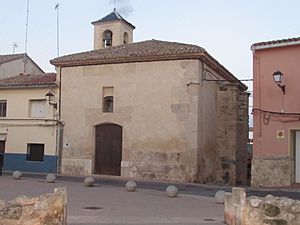Oratory of the Borgias facts for kids
Quick facts for kids Oratory of the Borgias |
|
|---|---|
| Oratory of the Borgias | |

Oratory of the Borgias
|
|
| 38°58′1.07″N 0°10′48.84″W / 38.9669639°N 0.1802333°W | |
| Location | Canals (Valencia) |
| Country | |
| Denomination | Roman Catholic |
| History | |
| Founded | 13th century |
| Architecture | |
| Style | Valencian Gothic |
| Administration | |
| Diocese | Valencia |
The Oratory of the Borgias, also known as the Church of the Tower, is a very old church in the town of Canals, in Valencia, Spain. It was built a long time ago, probably in the 13th century, in a style called Valencian Gothic.
This special building is located right in front of the Borgias Tower. It has been changed and fixed up many times over the centuries. Inside, you can find an old painting from the Middle Ages called the Last Judgment. People believe it was painted by an artist known as the Master of Borbotó. The oratory used to have a shield with the symbol of the famous House of Borgia family, but it was lost after some work was done in 1878. Originally, this oratory was part of the Borgia family's big palace complex, which was their main family home in the area called Torre de Canals.
Contents
What is the Oratory of the Borgias?
An oratory is a small chapel or a place for prayer. The Oratory of the Borgias was originally dedicated to the True Cross. This means it was a special place to honor a relic believed to be a piece of the cross Jesus was crucified on.
Building Style and Features
The Oratory of the Borgias has a simple design. It has one main room that is shaped like a rectangle. Its walls are made of stone and a mix called mortar. The roof is pointed, like a triangle, and is held up by two big arches inside. Part of the roof was made of wood.
Inside the Oratory
The main altar, which is a special table used for church ceremonies, was lost during the Spanish Civil War. However, people believe that one part of the main altar showed the True Cross. This was a very important gift from Pope Callixtus III, according to old stories passed down through history.
See also
 In Spanish: Oratorio de los Borja para niños
In Spanish: Oratorio de los Borja para niños
 | Valerie Thomas |
 | Frederick McKinley Jones |
 | George Edward Alcorn Jr. |
 | Thomas Mensah |

